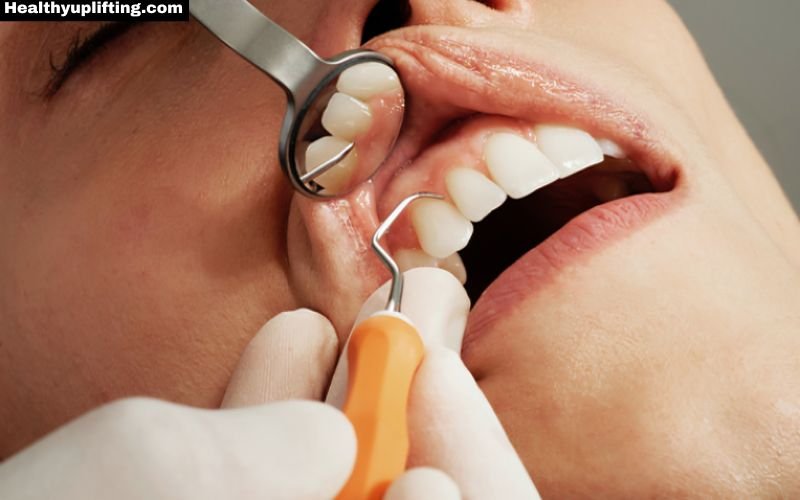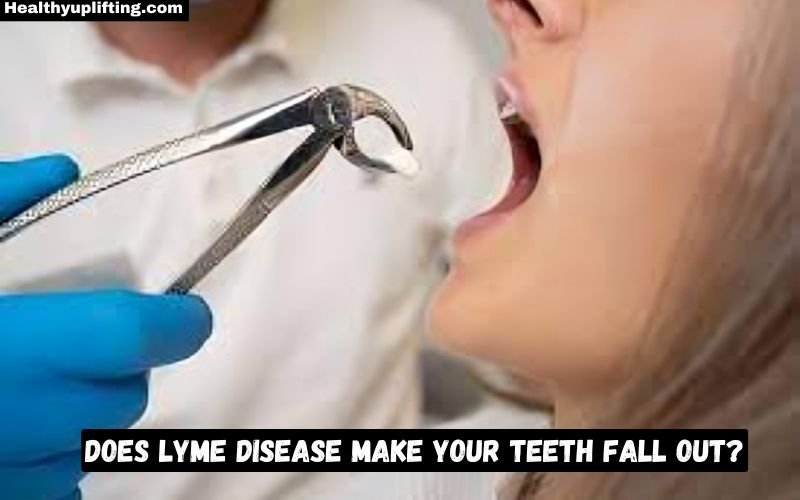Lyme disease, a tick-borne illness caused by Borrelia burgdorferi bacteria, is known for its complex and often chronic symptoms. While most people are aware of its common symptoms such as joint pain, fatigue, and neurological problems, its potential impact on oral health is less discussed. One question that some patients have raised is whether Lyme disease can cause their teeth to fall out.
Though Lyme disease itself does not directly lead to tooth loss, the systemic inflammation and other complications it causes can create conditions that may contribute to oral health problems. This article explores the potential connections between Lyme disease and dental issues, including how the illness might exacerbate conditions like gum disease, dry mouth, and jaw pain, which, in turn, could lead to tooth loss.
What Is Lyme Disease?
Lyme disease is the most common vector-borne disease in North America and Europe. It spreads primarily through the bite of infected black-legged ticks (commonly known as deer ticks). The bacteria Borrelia burgdorferi is the most prevalent cause, though in some regions, Borrelia mayonii can also be responsible.
The hallmark sign of Lyme disease in its early stage is erythema migrans, a bullseye rash that occurs in about 70-80% of cases. Other early symptoms include fever, chills, muscle aches, and headaches, which resemble the flu. If left untreated, Lyme disease can progress to more severe stages, impacting various organs and systems, including the heart, nervous system, and joints.
Lyme Disease and Oral Health: An Indirect Connection
Though Lyme disease does not directly cause teeth to fall out, there are several ways in which the disease’s symptoms and effects can influence oral health:

1. Gum Disease and Periodontitis
Gum disease (periodontal disease) is one of the most common causes of tooth loss. It begins with gingivitis (inflammation of the gums), which can progress to periodontitis, a more severe condition that affects the tissues and bones supporting the teeth. Studies have shown that systemic inflammation, like that caused by chronic infections such as Lyme disease, can worsen gum disease.
- Systemic Inflammation: Chronic Lyme disease leads to ongoing inflammation in various parts of the body. This systemic inflammation can worsen pre-existing conditions like gum disease. When the immune system is persistently activated, it may begin to attack healthy tissues, including the gums. This inflammatory response weakens the structures that hold teeth in place, potentially leading to tooth loss if not properly managed.
- Immune System Dysregulation: Lyme disease can cause immune system dysregulation, which may weaken the body’s ability to fend off infections, including those in the mouth. Patients with weakened immune responses are more susceptible to gum infections, which can escalate into periodontitis.
2. Autoimmune Reactions and Dental Health
Lyme disease has been known to trigger autoimmune reactions, which can affect various organs and systems in the body. One autoimmune condition that has oral health implications is Sjogren’s syndrome, which affects the glands that produce saliva and tears.
- Sjogren’s Syndrome and Dry Mouth: In patients with Lyme disease who develop autoimmune conditions like Sjogren’s syndrome, the production of saliva may be significantly reduced. Saliva plays a crucial role in protecting teeth by neutralizing acids produced by bacteria, washing away food particles, and providing disease-fighting substances. Without sufficient saliva, the mouth becomes more susceptible to tooth decay, gum disease, and eventually tooth loss.
Studies have found that patients with dry mouth are more likely to develop cavities, gum infections, and tooth decay, all of which can eventually lead to tooth loss if untreated. Therefore, Lyme disease-related autoimmune conditions may indirectly cause tooth loss by increasing the risk of oral health complications.
3. Facial Nerve Palsy and Oral Health Complications
Neurological symptoms are common in the later stages of Lyme disease. One specific manifestation, facial nerve palsy (Bell’s palsy), can lead to temporary or long-lasting facial muscle paralysis. This paralysis can make routine oral hygiene difficult, particularly if it affects one side of the face.
- Difficulty in Brushing and Flossing: Patients with facial nerve palsy may have difficulty brushing and flossing due to limited movement and coordination. Poor oral hygiene increases the risk of plaque buildup, which can cause cavities, gum disease, and eventually tooth loss. Additionally, facial nerve palsy may affect chewing, further complicating the ability to maintain proper oral health.
4. Temporomandibular Joint (TMJ) Disorders
Many Lyme disease patients report jaw pain or dysfunction, often caused by inflammation in the temporomandibular joints (TMJs). TMJ disorders can result from inflammation or muscle tension, both of which can be linked to Lyme disease’s systemic effects.
- Bruxism (Teeth Grinding): One of the indirect consequences of TMJ disorders is bruxism, or the grinding of teeth, often during sleep. Bruxism can wear down tooth enamel, damage fillings, and even cause fractures in teeth. Over time, untreated bruxism can lead to tooth loss due to excessive wear or damage to the tooth structure.
- Jaw Pain and Misalignment: TMJ disorders can also cause jaw misalignment, which may contribute to uneven pressure on certain teeth. This pressure can lead to cracked teeth or damage to dental work such as crowns or bridges.
5. Fatigue and Oral Hygiene
One of the most common symptoms of chronic Lyme disease is extreme fatigue. This persistent tiredness can make it difficult for patients to keep up with daily tasks, including basic oral hygiene routines such as brushing and flossing.
- Neglecting Oral Care: When Lyme disease symptoms are severe, patients may lack the energy to maintain a proper oral care routine. Neglecting regular brushing and flossing can lead to plaque buildup, gum disease, and tooth decay, all of which increase the risk of tooth loss over time.
- Inability to Attend Dental Appointments: The physical and mental fatigue associated with Lyme disease may also cause patients to miss routine dental checkups and cleanings. Skipping these appointments increases the likelihood of undiagnosed or untreated dental issues progressing to more serious conditions, such as periodontitis, which can lead to tooth loss.
6. Medication Side Effects and Oral Health
Many Lyme disease patients undergo long-term antibiotic treatment, especially in cases of chronic Lyme disease. While antibiotics help fight the Borrelia bacteria, they can also lead to side effects that impact dental health.
- Antibiotic-Induced Dry Mouth: Long-term antibiotic use can cause dry mouth, which, as mentioned earlier, increases the risk of tooth decay and gum disease. Without enough saliva, the acids produced by bacteria can more easily erode tooth enamel, leading to cavities and tooth loss.
- Disruption of Oral Flora: Antibiotics can disrupt the balance of healthy bacteria in the mouth, making it easier for harmful bacteria and fungi (such as Candida) to grow. Oral thrush, a common yeast infection caused by Candida overgrowth, can lead to discomfort, sores, and difficulty maintaining oral hygiene. If oral health is compromised, it may lead to complications that increase the risk of tooth loss.
Preventing Tooth Loss in Lyme Disease Patients
Although Lyme disease can complicate oral health, there are steps patients can take to mitigate the risk of tooth loss:
1. Maintain a Rigorous Oral Hygiene Routine
Despite the fatigue and discomfort caused by Lyme disease, maintaining an oral hygiene routine is essential for preventing dental issues. Brushing twice daily with fluoride toothpaste, flossing, and using an antimicrobial mouthwash can significantly reduce the risk of gum disease and tooth decay.
2. Combat Dry Mouth
Patients experiencing dry mouth should stay hydrated and use sugar-free chewing gum or lozenges to stimulate saliva production. There are also over-the-counter saliva substitutes that can help keep the mouth moist.
3. Seek Treatment for TMJ Disorders
Patients experiencing jaw pain or bruxism should consult a dentist who specializes in TMJ disorders. Nightguards, physical therapy, and anti-inflammatory medications can help alleviate pain and prevent further damage to the teeth.
4. Visit the Dentist Regularly
Routine dental visits are crucial for Lyme disease patients, as they allow for early detection of gum disease, cavities, and other oral health issues. Patients should inform their dentists about their Lyme disease diagnosis to receive personalized care.
5. Consult with Lyme-Literate Health Providers
Working with healthcare professionals who understand the complexities of Lyme disease can help patients address both the systemic and oral health challenges associated with the illness. Lyme-literate dentists and doctors can offer targeted treatments to mitigate the impact of the disease on oral health.
See Also: What Condition Does Imane Khelif Have?
FAQs
Can Lyme disease directly cause teeth to fall out?
No, Lyme disease itself does not directly cause teeth to fall out. However, the illness can create conditions that may contribute to dental problems, such as gum disease, TMJ disorders, dry mouth, and fatigue, which could indirectly increase the risk of tooth loss.
How does Lyme disease affect dental health?
Lyme disease can lead to systemic inflammation, immune system dysregulation, and autoimmune reactions that may worsen gum disease (periodontitis), cause dry mouth, and increase susceptibility to oral infections. Additionally, neurological issues like facial nerve palsy or TMJ disorders can affect jaw function and make it difficult to maintain proper oral hygiene, leading to potential dental issues.
What is the connection between Lyme disease and gum disease?
Lyme disease causes chronic inflammation, which can exacerbate gum disease (gingivitis or periodontitis). Systemic inflammation weakens the gums and supporting tissues, increasing the risk of gum disease, which is a leading cause of tooth loss if untreated.
Can Lyme disease trigger autoimmune conditions that affect oral health?
Yes, Lyme disease can trigger autoimmune conditions, such as Sjogren’s syndrome, which leads to dry mouth. This reduction in saliva increases the risk of tooth decay and gum disease, as saliva plays an important role in protecting teeth from bacteria and acids.
What dental issues are associated with TMJ disorders in Lyme disease patients?
TMJ (temporomandibular joint) disorders, caused by inflammation of the jaw joints, can lead to jaw pain, misalignment, and bruxism (teeth grinding). These issues may wear down teeth, damage dental work, and contribute to tooth loss over time.
How can Lyme disease-related fatigue affect oral health?
Chronic fatigue caused by Lyme disease can make it difficult for patients to maintain a consistent oral hygiene routine. Skipping regular brushing and flossing can lead to plaque buildup, gum disease, and tooth decay, increasing the risk of tooth loss over time.
Conclusion
Lyme disease does not directly cause teeth to fall out, but its symptoms and complications can create conditions that increase the risk of dental problems. Chronic inflammation, autoimmune reactions, TMJ disorders, fatigue, and the side effects of long-term antibiotic use all contribute to the potential for oral health issues that may lead to tooth loss. However, with proper management and attention to dental care, Lyme disease patients can protect their teeth and gums from the indirect effects of this complex illness.
Maintaining good oral hygiene, seeking regular dental care, and addressing the systemic effects of Lyme disease are key steps in preventing tooth loss and ensuring overall oral health.

